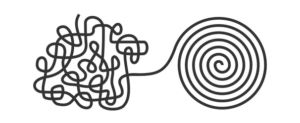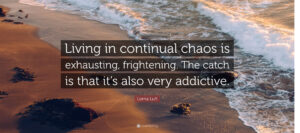~~~~~~~~~~~~~~~~~~~~~~~~~~~~~~~~~~~~~~~~~~~~~~~~~~~~~
“It is impossible to understand addiction without asking what relief the addict finds, or hopes to find, in the drug or the addictive behaviour.”
― Gabor Mate, “In the Realm of Hungry Ghosts:
Close Encounters with Addiction”
~~~~~~~~~~~~~~~~~~~~~~~~~~~~~~~~~~~~~~~~~~~~~~~~~~~~~
 This is my last post in the series on addictions. Today, we will dig into the addiction to chaos.
This is my last post in the series on addictions. Today, we will dig into the addiction to chaos.
Addiction to chaos is a fairly new psychological term that refers to living in a regular or intermittent state of drama, turmoil, chaos, or tension. Often, it is paired with alcohol or drug addiction, but also sober people are found expressing this dysfunctional behavior.
A popular way of describing them is trauma/drama queens. Generally, people who are addicted to chaos are following the path of their childhood caretakers. Often, they are trying to distract themselves from their own pain. If the issue isn’t lifelong, it could be a bad relationship that they feel stuck in. It could be feelings of unworthiness. Most likely included are traumatic memories from childhood.
Many are unwilling to admit their destructive behavior and will blame it on others. However, in order to begin healing from chaos addiction, people must first see and admit the chaos is coming from them. They must also be dedicated to the process of getting help, usually in the form of psychotherapy and/or energy psychology.
 One of the challenges with chaos addiction is that, like negativity addictions, we carve little receptor pathways into the brain for this behavior. We literally develop neuropeptides for chaos.
One of the challenges with chaos addiction is that, like negativity addictions, we carve little receptor pathways into the brain for this behavior. We literally develop neuropeptides for chaos.
As most people are aware, non-stop, high-stress levels affect the body negatively, releasing destructive hormones that wear out the heart, digestive tract, and adrenals. This leads to depression, digestive issues, sleep problems, and memory impairment. It also can enter the DNA and create generational trauma for the children and grandchildren.
For those who are tired, creating chaos stimulates the adrenals, so that temporarily gives the body more energy. That energy steals from the adrenals, who are already depleted. For example, I had a client who would blow up at others. She told me that she always felt better afterwards for a little while, then would descend into self-recrimination. I ended our relationship the second time she blew up at me.
 Most of us exhibit some chaotic behavior at various points in our lives, driven by a way over-crowded work or home schedule, too much technology, not setting boundaries on aggressive people, and living with a person with an addiction to chaos.
Most of us exhibit some chaotic behavior at various points in our lives, driven by a way over-crowded work or home schedule, too much technology, not setting boundaries on aggressive people, and living with a person with an addiction to chaos.
Things to Consider:
If you have chosen to have a personal relationship where the other person is addicted to chaos, there is a possibility that you are the flip side of the issue, and have also grown up with chaos. You may not be creating it, but are living in what feels “comfortable.” Staying with them as they are makes you an enabler.
Alternately, if the chaos is merely a temporary behavior brought on by the current stress of your friend/lover/spouse/housemate/work/family, this may clear up once the crisis is over.
If you are the one who has chaos following you around, then it would be good to realize that you make things difficult for those around you. You may also be pushing others away who could be of benefit to you.
 What can you do about it?
What can you do about it?
If you are living with a chaos addict, it is best to first discuss it with them. Explain how exhausting or embarrassing or infuriating their behavior is to you. Request that the addict work on changing that behavior. If they refuse to acknowledge their responsibility in the madness, think of your own health and sanity, and consider leaving them.
If chaos is not the usual behavior of your person’s lifestyle, ask how you may help them in their quest for peace and calm. Perhaps they are overbooked, and they could retract some of their commitments. If they refuse to consider new avenues of behaving, distance them for your own sanity.
If you suspect you are the chaos addict, it is time for some serious soul searching. Take time to look through your past. Look for behavioral patterns in your early caretakers. Were they damaged? What large, painful trauma happened in their lives? Are you acting out their behaviors? What happened in your youth that could be now contributing to your regular display of bedlam? What steps, exactly are you going to take to change your behavior?

This is a troublesome addiction, and it will take time, self-love, understanding and patience to work it through. Rarely does anyone come out of it without work with a therapist or energy psychologist.
I have added a tapping protocol to assist you and /or to recommend to a friend who needs help. It does not, by any means, provide enough help to work it out yourself, but it can get you started. As usual, you may need to change the words around to more clearly fit your own needs. While you are at it, you might work with some of the other tapping pages I have created for my clients such as Feeling Overwhelmed or the one that focuses on anger tapping. Feel free to peruse the whole section to see what might be helpful.
As usual, I am available to help you with clearing out old patterns that may keep you stuck in recurring chaos or any other behavior that doesn’t serve you. Email for your appointment: dr.robin@CompassionateClearing.com
